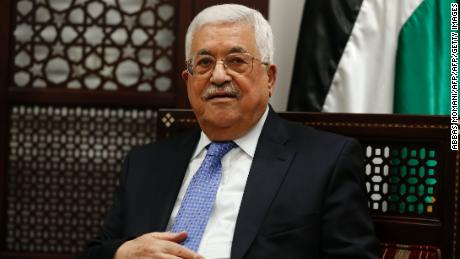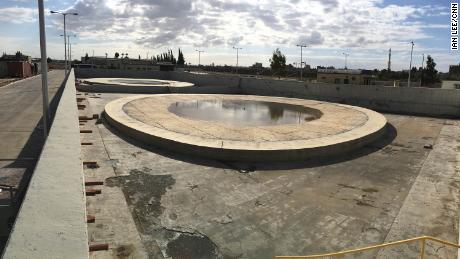Their mother, Ra'eda, looks on at her two children, neither of them old enough to really understand the daily struggles of Gaza."Life in Gaza is full of pain on all levels, economically, socially and on all levels," Ra'eda said. "It's very difficult."We first met the Al Dan family at the end of July 2014 on the day baby Feras was born. He is known to his family as the son of war. Ra'eda had just arrived at the Shiffa Hospital in Gaza City. It was the height of the war between Hamas and Israel, which began after Hamas fired rockets into Israel. Israel responded with a military operation in Gaza. Doctors said the stress from the constant aerial bombardment was inducing complications in mothers-to-be; and so it was too for Ra'eda, who needed a C-section.After an hour's anxious wait, a healthy eight-pound, two-ounce baby boy appeared."He was born during the war, that's why we called him the son of the war," Ra'eda said. "He is always very angry, but with a brave character."Life hasn't changed much since the guns fell silent. Electricity is still intermittent. The family home currently gets about four hours' supply a day. It's almost like a switch goes on in the children when the power comes back on — Feras and Rahaf sprint to the TV as it blinks back to life, to watch children's programming and WWE Wrestling. Ra'eda and her mother start the laundry.Medical care is another problem the family faces. Ra'eda said her brother died recently because he couldn't get proper treatment in Gaza and couldn't get permission to travel to Israel or Egypt, which control the borders. It's a problem that she worries about for herself. Recently, she found a lump in her breast. She sold her jewelry to have a mastectomy as a precautionary measure. Doctors later told her she had cancer."The only way to get proper treatment is to go abroad but it will be difficult," says the mother of three. "I'll have to leave my children."CNN went to see what treatment for cancer patients is like in Gaza. Doctors describe a constant struggle to keep hospitals stocked with medicines and equipment.Gaza has been under what the UN describes as a blockade since 2007, when Hamas ousted the rival Palestinian faction, Fatah. Israel and Egypt control what, and who, can go in and out. They say it's part of an effort to prevent shipments of weapons and other materials to Hamas, which the US government and the European Union consider a terrorist organization.Ra'eda will be seeking treatment at Abdel Al Aziz Al Rantisi hospital. Doctors here deal with most of Gaza's cancer patients; 10% are children, who receive priority care."The main problem we have here for chemotherapy is the disruption of the cycles," said doctor Dr Talha Balosha. "We had a crisis for six to seven months when our supply was cut off (by) the (Palestinian) ministry of health in Ramallah."In addition, Israel used to supply 120 megawatts of power from its own plants, but that figure fell in April this year to 70 megawatts, after the Palestinian Authority — in a move designed to punish Hamas — said it would no longer pay Israel for the full amount. Finally, Egypt also provides an inconsistent 28-megawatts supply. All together it's still not enough to keep the lights on across the Strip for longer than four to six hours each day. The Palestinian Authority, which controls the West Bank and is seeking to reassert authority in Gaza, imposed sanctions on the territory in March, reducing payments for electricity that Israel supplies to Gaza and cutting salaries of civil servants."Since March, until the beginning of November, all medications, including the chemotherapy treatments, were cut off from Gaza by the Palestinian Ministry of Health," Hospital Director Mohamed Abu Salmia said. "It was part of the measures imposed on Gaza by President Mahmoud Abbas.
'Their final destination will be death'
Balosha reassures his patients that they do have enough chemotherapy for now, but admits he never knows when the shipments could be disrupted."In our hospital we've had 13 patients die because of no chemotherapy or during what we call the medical referral problem," Balosha said. "Patients can't find their chemotherapy here so the doctors make the medical referrals for them to West Bank or Jerusalem. If they can't leave Gaza, they should wait until chemotherapy arrives here. If they can't find it here, their final destination will be death, unfortunately." The Palestinian Authority denies accusations that medical supplies to Gaza were cut off, and blames Israel for any shortfall. It also says that provisions are made for all Gaza cancer patients to be moved to hospitals in Jerusalem and the West Bank.For its part, Israel says it provides what it calls humanitarian assistance to Gazans; delays to any shipments are to make sure nothing gets in that could benefit Hamas and its militants.The rolling blackouts also wreak havoc on the medical equipment. Dialysis patients are either forced to wait for the generators to kick in, or start their daily treatment over.
The Palestinian Authority denies accusations that medical supplies to Gaza were cut off, and blames Israel for any shortfall. It also says that provisions are made for all Gaza cancer patients to be moved to hospitals in Jerusalem and the West Bank.For its part, Israel says it provides what it calls humanitarian assistance to Gazans; delays to any shipments are to make sure nothing gets in that could benefit Hamas and its militants.The rolling blackouts also wreak havoc on the medical equipment. Dialysis patients are either forced to wait for the generators to kick in, or start their daily treatment over.
Power shortage
CNN went to talk to people at Gaza's only power station. Engineers describe how Gaza needs about 600 megawatts to supply the coastal enclave. The power plant can generate 140 megawatts but produces less than half that amount, because there isn't enough fuel. Israel destroyed two fuel storage containers in the 2014 war, and it's not possible to supply the plant as quickly as needed."We are trying our utmost. Really the situation in Gaza is very difficult and people can't understand the problems we are facing," said plant general manager Rafiq Maliha. "They need electricity and they don't want to listen who is responsible for the problem. They want electricity, as simple as that."It hasn't been simple for Rafiq Maliha. His engineers have to get creative to keep the plant running. "The Gaza Strip is under a blockade for almost 10 years; because of that, if you need anything, any small thing, you need to coordinate it through the Israelis and that usually takes months."Power shortages also mean that sewage flows untreated into the Mediterranean, making beaches unsafe and contaminating seafood.And when it rains, the aging sewers in Gaza's cities overflow.Back at Feras' house, he wants to see the rain. He's eager to play in it."I wish their life will be better than ours," Ra'eda tells me. "I hope they will be a different and better generation than us."
"The Gaza Strip is under a blockade for almost 10 years; because of that, if you need anything, any small thing, you need to coordinate it through the Israelis and that usually takes months."Power shortages also mean that sewage flows untreated into the Mediterranean, making beaches unsafe and contaminating seafood.And when it rains, the aging sewers in Gaza's cities overflow.Back at Feras' house, he wants to see the rain. He's eager to play in it."I wish their life will be better than ours," Ra'eda tells me. "I hope they will be a different and better generation than us."
Original Article
[contf] [contfnew] 
CNN
[contfnewc] [contfnewc]




